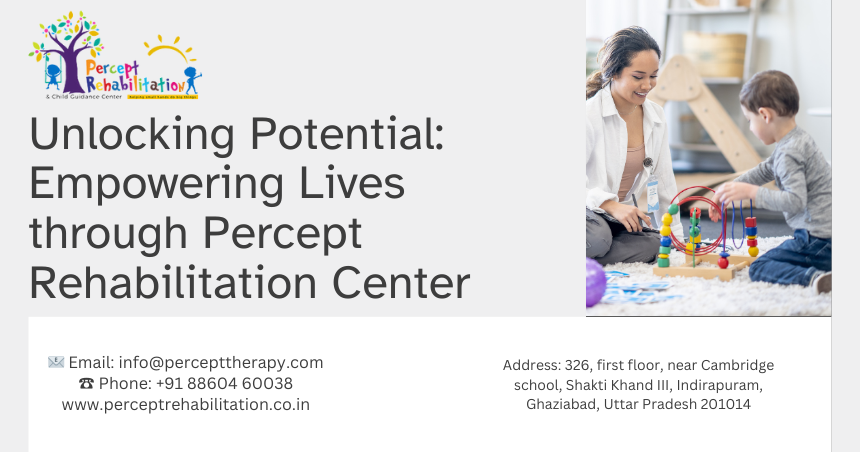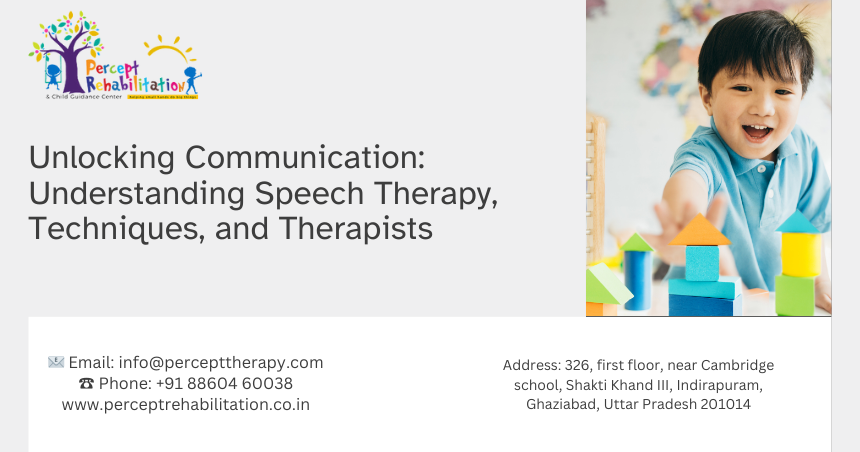Reading is not just about recognizing letters; it’s a cognitive process that integrates listening, speaking, memory, attention, and visual processing. For many children, especially those facing developmental delays or communication challenges, this journey requires support that goes beyond classroom instruction. Speech therapy provides structured intervention to strengthen foundational language skills, directly influencing reading readiness. At Percept Rehabilitation Centre, we focus on individualized speech and language development, and parents seeking the best speech and language therapy in Indirapuram often turn to our center to prepare their children for reading success.
What is Reading Readiness?
Reading readiness refers to the level at which a child is prepared to begin learning how to read. It includes a combination of skills such as:
- Phonemic awareness (recognizing sounds)
- Vocabulary knowledge
- Listening comprehension
- Print awareness
- Verbal expression
- Memory and attention control
These skills develop at different rates for each child. Speech therapy enhances these components by focusing on both expressive and receptive language abilities, helping children grasp the structure and meaning of language.
The Connection Between Language and Reading
Language is the backbone of reading. A child must first understand spoken words before they can make sense of written text. Speech therapy targets the root of many reading challenges by strengthening oral language. When children struggle with articulation, vocabulary, sentence structure, or auditory processing, reading becomes more difficult. Speech therapy identifies these challenges and addresses them early, setting the stage for smoother reading development.
Core Language Skills Speech Therapy Builds for Reading Readiness
1. Phonological Awareness
Children need to hear and manipulate sounds within words. This includes:
- Recognizing rhyming words
- Identifying beginning, middle, and ending sounds
- Blending sounds to make words
- Segmenting words into individual sounds
Speech-language pathologists (SLPs) use playful, structured techniques to develop these abilities. Strengthening phonological awareness is a direct bridge to decoding skills used in reading.
2. Vocabulary Expansion
A robust vocabulary helps children understand what they read. SLPs work to improve both the number of words a child knows and their understanding of word meanings in different contexts. Strategies include:
- Categorization games
- Describing objects
- Opposites and synonyms
- Sentence construction with new words
3. Sentence Structure and Grammar
Correct use of grammar and sentence organization helps children understand written language structure. SLPs guide children through tasks such as:
- Expanding simple sentences
- Practicing verb tenses
- Using plurals and pronouns correctly
- Constructing complex sentences
These exercises help children grasp how words fit together to form meaning, both spoken and written.
4. Auditory Memory and Processing
Children need to remember what they hear to respond and build knowledge. Weak auditory memory can make it hard for children to follow instructions or retain story elements. Speech therapy incorporates techniques such as:
- Repeating sequences
- Following multi-step directions
- Answering questions after short stories
- Remembering auditory details and patterns
Improving auditory processing supports reading fluency and comprehension.
Signs a Child May Benefit from Speech Therapy Before Learning to Read
Some children enter preschool or kindergarten with subtle language weaknesses that can impact reading. Watch for these indicators:
- Limited vocabulary for their age
- Difficulty forming complete sentences
- Trouble following verbal instructions
- Mispronouncing sounds or syllables frequently
- Difficulty rhyming or identifying beginning sounds
- Inability to retell stories or events in order
- Poor attention span during listening tasks
If these signs are present, early intervention through speech therapy can change the trajectory of the child’s literacy development.
Role of SLPs in Pre-Reading Environments
Speech-language pathologists play a collaborative role in early childhood settings. They work alongside teachers, parents, and other professionals to develop a comprehensive plan for language development. Their role includes:
- Assessing a child’s current language level
- Setting individualized language goals
- Engaging the child through structured play, storytelling, and conversation
- Integrating reading readiness into therapy sessions
- Training parents in language-building activities at home
How Speech Therapy Sessions are Structured for Reading Readiness?
Speech therapy is tailored to the child’s current skill level and goals. Sessions often include:
- Listening games to build attention and memory
- Rhyming activities for phonological awareness
- Picture description tasks to encourage expressive language
- Story sequencing exercises to boost comprehension
- Sound-letter matching tasks to build decoding readiness
- Visual cues to support word retrieval
Therapists adjust their methods depending on how the child responds. They observe language use in real time, making ongoing refinements.
Speech Therapy and Children with Special Needs
Children with autism, ADHD, hearing impairments, or developmental delays often need extra support in language development. Reading readiness becomes more complex in these cases. Speech therapy bridges gaps by providing:
- Visual and tactile supports
- Simplified language models
- Repetitive, structured practice
- Communication boards or devices, if needed
- Joint attention and social language strategies
For these children, early and consistent speech therapy dramatically improves their ability to access written language over time.
Long-Term Benefits of Speech Therapy on Literacy
The impact of speech therapy goes far beyond early reading. Language intervention helps children:
- Develop a lifelong love for books
- Express themselves clearly in writing
- Participate confidently in classroom discussions
- Follow written instructions independently
- Succeed academically across all subjects
These foundational skills are essential for educational success. When addressed early, they reduce the need for remediation in later years.
Speech Therapy Activities That Build Reading Readiness
Here are some common activities speech-language pathologists use in therapy to develop pre-reading skills:
1. Sound Sorting
Children sort objects or pictures based on beginning sounds to develop phonemic awareness.
2. Interactive Storytelling
Children retell familiar stories using props, which builds sequencing and narrative skills.
3. Name That Object
Naming and describing objects from pictures encourages vocabulary growth and word recall.
4. Rhyming Hunts
Children find items that rhyme with a given word to develop sound recognition.
5. “Simon Says” with Language Cues
Combines movement with verbal directions to strengthen auditory memory and receptive language.
These activities can be customized and used at home or school in coordination with speech therapy goals.
Supporting Language Growth at Home
Parents play a key role in language development. Simple, daily routines can reinforce therapy goals:
- Read aloud every day with expression
- Ask open-ended questions about stories
- Describe what you’re doing in daily tasks
- Use songs and rhymes during play
- Encourage storytelling through drawings
- Label household items and repeat their names
When speech therapy and home activities work hand in hand, children progress faster toward reading readiness.
Speech Therapy Myths and Misconceptions
Some families hesitate to begin speech therapy due to common myths. It’s important to clarify:
- “My child will outgrow it”: While some language delays resolve naturally, many persist without support. Early therapy makes a lasting difference.
- “Speech therapy is just for pronunciation”: Therapy addresses many areas, including comprehension, grammar, memory, and vocabulary.
- “Only children with special needs need therapy”: Many typically developing children benefit from speech support, especially for reading preparation.
- “My child talks fine, so reading won’t be a problem”: Strong oral language doesn’t always guarantee strong reading. Subtle deficits can exist.
Parents who address these concerns early empower their children for lifelong academic success.
Role of Early Intervention in School Success
Research and experience in therapy settings consistently show that language skills developed before age 7 have a profound impact on a child’s academic path. Early speech therapy intervention:
- Minimizes reading difficulties in elementary years
- Reduces frustration and behavioral issues related to communication
- Improves self-esteem and classroom participation
- Enhances ability to grasp other academic subjects
Speech therapy is not remedial—it’s developmental. It equips children with the tools they need before formal education creates gaps.
When to Start Speech Therapy for Reading Readiness
Speech therapy can begin as early as age two or three, especially if a child shows signs of delayed language. Parents should consider early evaluation if:
- The child has fewer than 50 words by age two
- Sentences are hard to understand by age three
- The child struggles with sound patterns or has inconsistent speech
- There is difficulty naming objects or following directions
- Reading activities like rhyming or sound games are unusually difficult
Early detection through standardized assessments ensures that intervention is timely and effective.
Why Choose Percept Rehabilitation Centre?
At Percept Rehabilitation Centre, every child receives focused attention from dedicated professionals who are deeply committed to speech and language development. Families searching for the best speech and language therapy in Indirapuram consistently place their trust in our approach because we prioritize individualized, child-centered strategies that support early literacy and overall communication. Our methods are play-based, evidence-driven, and aligned with each child’s natural language journey. Through collaborative support and consistent progress monitoring, we help prepare children for a confident start in their reading experience.



